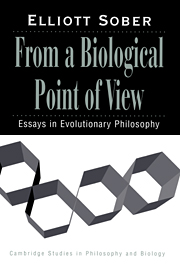Book contents
- Frontmatter
- Contents
- Acknowledgments
- Introduction
- 1 Did evolution make us psychological egoists?
- 2 Why not solipsism?
- 3 The adaptive advantage of learning and a priori prejudice
- 4 The primacy of truth-telling and the evolution of lying
- 5 Prospects for an evolutionary ethics
- 6 Contrastive empiricism
- 7 Let's razor Ockham's razor
- 8 The principle of the common cause
- 9 Explanatory presupposition
- 10 Apportioning causal responsibility
- 11 Evolution, population thinking, and essentialism
- 12 Temporally oriented laws
- Index
6 - Contrastive empiricism
Published online by Cambridge University Press: 14 January 2010
- Frontmatter
- Contents
- Acknowledgments
- Introduction
- 1 Did evolution make us psychological egoists?
- 2 Why not solipsism?
- 3 The adaptive advantage of learning and a priori prejudice
- 4 The primacy of truth-telling and the evolution of lying
- 5 Prospects for an evolutionary ethics
- 6 Contrastive empiricism
- 7 Let's razor Ockham's razor
- 8 The principle of the common cause
- 9 Explanatory presupposition
- 10 Apportioning causal responsibility
- 11 Evolution, population thinking, and essentialism
- 12 Temporally oriented laws
- Index
Summary
Despite what Hegel may have said, syntheses have not been very successful in philosophical theorizing. Typically, what happens when you combine a thesis and an antithesis is that you get a mishmash, or maybe just a contradiction. For example, in the philosophy of mathematics, formalism says that mathematical truths are true in virtue of the way we manipulate symbols. Mathematical Platonism, on the other hand, holds that mathematical statements are made true by abstract objects that exist outside of space and time. What would a synthesis of these positions look like? Marks on paper are one thing, Platonic forms another. Compromise may be a good idea in politics, but it looks like a bad one in philosophy.
With some trepidation, I propose in this paper to go against this sound advice. Realism and empiricism have always been contradictory tendencies in the philosophy of science. The view I will sketch is a synthesis, which I call Contrastive Empiricism. Realism and empiricism are incompatible, so a synthesis that merely conjoined them would be a contradiction. Rather, I propose to isolate important elements in each and show that they combine harmoniously. I will leave behind what I regard as confusions and excesses. The result, I hope, will be neither contradiction nor mishmash.
- Type
- Chapter
- Information
- From a Biological Point of ViewEssays in Evolutionary Philosophy, pp. 114 - 135Publisher: Cambridge University PressPrint publication year: 1994
- 4
- Cited by

